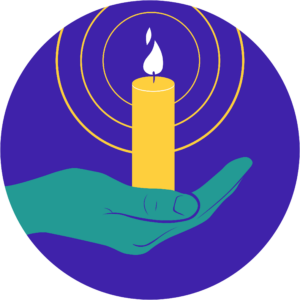Bagels & Banter: Pop-Up Discussion Series 
Bagels & Banter is a pop-up series coordinated with members of the UMBC Religious Council where the discussion centers around trending global, national, state, local, or population-based topics in an informal, casual semi-structured atmosphere while enjoying delicious bagels and hot beverages. Session topics are typically chosen one to two weeks before the session via polls or comments on our respective Google Forms, social media posts, and myUMBC group page event post. Participation in selecting topics is highly encouraged. Bagels & Banter is open to all UMBC community members.
Donuts & Dialogue | Music & The Mosaic 
Donuts & Discussion and Music & The Mosaic are two pop-up series where in an informal, casual atmosphere, we discuss trending multicultural events, population-based topics, and current music trends globally while also enjoying beverages and donuts! This is a time to talk about anything that comes to mind, ranging from a video you saw to recent topics in pop culture and even how current music trends impact social climates.
“I Am / We Are” Dialogue Series 
“I am / We Are” Dialogue Series was created around the Racial and Cultural Identity Development model of Introspection and Integrative Awareness. “I Am / We Are” is in reference to self-identification when being asked questions relating to identity and creating a self and community-based appreciation around identity and culture. “I am / We Are” centers dialogue around having multiple intersecting identities, how both seen and unseen identities are shaped by social and community climates, and creating an understanding of how identity is a “both/and” and not “either/or”. These dialogues will be focused on the experiences of Bi-racial/Multiracial, Multiethnic, and Multicultural individuals and how to understand all aspects of identity relating to racial and cultural awareness and development.
Let’s Get Reel: Intersectional Film Discussion Series
The Let’s Get Reel: Intersectional Film Discussion Series explores how filmmakers from diverse backgrounds and lived experiences make meaning of their various social identities through an intersectional lens. How are race, ethnicity, age, education, religion, national origin, generation, socioeconomic status, ability status, sexual orientation, and gender identity impacted by the social realities here in the U.S. and globally? How can films be tools for disrupting harmful images and false narratives? How can filmmakers help us imagine new pathways to achieve equity, justice, and collective liberation for all of humanity? If these questions are of interest to you, join us as we make connections between film art and social justice.
MediaBytes: Media Dialogue Program
MediaBytes is a dialogue program using different forms of medium, including Podcasts (i.e., PodBytes), VideoBytes (i.e., Video), and so on, to engage in difficult dialogues around challenging topics. This is a space for community members to talk about the media they love while connecting it to a broader discussion on the highlighted topic for each session. No prior knowledge is required-just an openness to listening and engaging as we explore media together!
Mundo Lingo: Conversation Starter Series 
Mundo Lingo encourages community members to come for a casual conversation with each other while being exposed to different cultural items, food, and campus organizations. This may be done through a film screening and discussion, trying out a new recipe, or discussing a culturally specific topic either within the U.S. or internationally. Mundo Lingo has no critical focus on how our socio-political world impacts cultural differences but rather focuses on exposure to cultural phenomena and their respective people.
OCA Mocha Mondays: Diversity Dialogue Program 
OCA Mocha Mondays is a Diversity Dialogues program that connects members of UMBC’s campus and the local community to engage in dialogue about different social justice topics. In alignment with the acronym that inspired the café’s name, OCA (Opportunities for Community Alliances), Mocha’s mission is to bridge the gap between our campus and community. OCA Mocha Mondays are designed to engage people of various backgrounds, identities, and skill levels to discuss social justice issues that impact our society. Free Transit lines are available for UMBC students, staff, and faculty with limited transportation or as an eco-friendly option. To see the bus schedule, please visit the UMBC Transit Schedule Website.
PAWTalks: Storytelling Speaker Series
PAWTalks is a TEDTalk-inspired series created to highlight the richness of various cultures through storytelling from diverse speakers representing various backgrounds. This series highlights an interactive cultural sharing experience relating to the speaker’s identity, social justice issues relevant to them, and how their social identity development has informed their activism and/or career. Speakers share their lived experiences to influence introspection of one’s own identity. This is done through art, music, film, book, or other performance or presentations in conjunction with the traditional “TEDTalk” style. After the talk, time is allotted for discussion at the end of each session for community members to ask questions or share their own stories causing higher visibility of various social identities. PAWTalks aim to raise identity consciousness for those with different identities while affirming those with similar identities of the speaker. These talks are typically recorded and available online on our myUMBC group page.
The Closet Collective: LGBTQIA2+ Questioning Discussion Group 
Are you questioning your LGBTQIA2+ identity? Are you out to yourself but unsure of what the next steps could look like during your closeted experience? Then the Closet Collective may be a space for you! “Coming out” can be one of the most challenging processes of the LGBTQIA2+ experience. The Closet Collective is a self-care and community-building group that centers on UMBC community members who are questioning their sexual orientation, romantic orientation, gender, and/or gender expression. Meetings will occur regularly and will be determined based on the needs and size of the group. Due to the nature of this discussion group and to limit harm related to outing, locations will not be advertised. A form will be available to complete to avoid any information leaving beyond the group.
What’s Poppin’@Pride?: Pop-Up Series 
What’s Poppin’@Pride is about community building and sharing a meal together. This informal program serves as a time to connect in The Pride Center by enjoying popcorn, other snacks, and playing games in the lounge with our i3b community, staff, and/or other LGBTQIA2+ community leaders. This pop-up series can also offer an opportunity to discuss trending global, national, or local-LGBTQIA2+-based topics in an informal, casual atmosphere. All are welcome to attend.
What’s The (T)ea?: Social Justice Dialogue Series 
What’s The (T)ea? is a series geared toward exploring various social justice-related and/or identity-developmental topics and issues affecting various marginalized populations. The title of this series comes from the phrase “What’s the T?”, a phrase originating from the 1970s-1980s Black Gay Ball culture, meaning “What’s going on?” or “What’s up?.” As such, the titles of these sessions are typically structured in the form of a question. The sessions focus on creating space for participants to grapple with the question at hand, specifically concerning how their identities may play a role in the subject in question. Each session includes a brief lecture with background information followed by pair-share, table, and large group discussions while enjoying tea and snacks. The series aims to explore the background historical influences that impact the discussion topic and explore how interaction styles can show up in dialogue with others to shift how community members can incorporate vulnerable social justice dialogue practices in their personal lives.